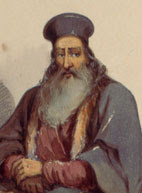A summary of Georgios Regas' Typikon (1908) and his Chapter X.1. 'On when the deacon should vest'.
(1) the deacon vests for feasts with an entrance in the vespers and a great doxology in the orthros, as well as the feast of the annunciation, presanctified liturgies and the holy Passion. he may also vest for any divine liturgy throughout the year.
(2) at the vespers of a vigil he vests during the stichologia of the 'Blessed is the man', if it is not said, then during the Introductory psalm or the stichologia of the psalter; he remains vested till the dismissal.
(3) if there is no vigil he vests before the initial blessing of the vespers, during the reading of the introductory psalm or during the reading of the kathisma; he remains vested till the dismissal.
(4) at the orthros, whether there is a vigil or not, if there is a gospel he vests during the anabathmoi chanted before it and remains vested till the beginning of the first hour; if there is no gospel then he vests during the 8th ode and remains vested till the 1st hour. the same is done for the holy Passion.
(5) for each liturgy or presanctified he vests before the beginning in order to perform the proskomide with the priest and remains vested until the dismissal.
(6) at the vespers without an entrance and orthros without a great doxology (except for the holy Passion, Annunciation and celebrated saints in the Great Fast) as well as the complines and hours only the priest vests.
(7) by exception the deacon vests at the orthros of Great Saturday during the chanting of the Theos Kyrios.
(8) in orthros and vespers of the week of new creation the deacon vests before the enarxis of necessity.
In Chapter I.15: without a priest [translation]
When the daily services are performed in parecclesion, or hermitages, or monastic cells, or personally in a home and there is no priest, then none of the priest's parts are said, neither litany, nor gospel, nor exclamation, nor blessing or dismissal. But in the beginning of the service, instead of the Blessed is our God, the Through the prayers of our holy fathers is said; the same as for the May God be gracious unto us, and at the end of the service instead of the dismissal we say, Glory, Both now, Lord have mercy (thrice) and the Through the prayers of our holy fathers. And nothing more, for all excess is from the evil one.
skip to main |
skip to sidebar

Ancient Chant in a Postmodern World
Subscribe Now: standardSmall
Blog Archive
Links
About Me

- FRCJT
- I was born in East St Louis, Illinois in 1961 and grew up in South St Louis, Missouri. I abandoned the music program at Southern Illinois University after deciding to study theology. To this end I enrolled at Hellenic College, Holy Cross Greek Orthodox School of Theology and received the BA and MDiv degrees from these schools. From there I received scholarships to complete a doctoral dissertation in Byzantine Musicology at the School of Theology of the National and Capodistrian University of Athens, Greece, from which I received the ThD in the year 2000; my dissertation was published in the Meletai series of the Institute of Byzantine Musicology. Most dear to my heart is the family I have been blessed with: my wife Diann, my daughter, Maria, and one unborn child God decided to keep for Himself. Presently, I live on the island of Aegina with my family and where I presently sit and write my psaltic musings.